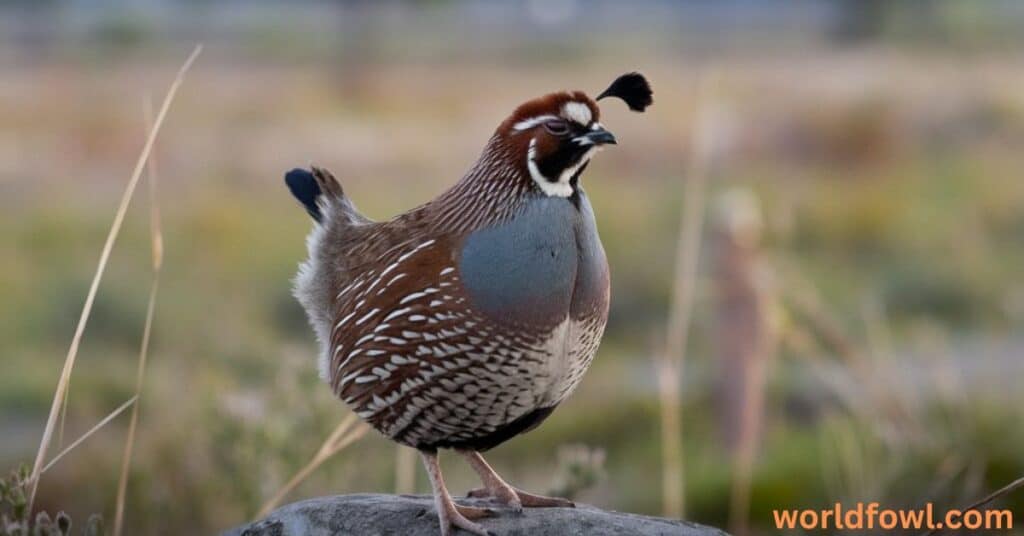When it comes to birds, quails might not be the first ones that come to mind, but these small and fascinating creatures have intrigued wildlife enthusiasts, bird watchers, and even researchers for years. Their unique behaviors, rapid movements, and flight patterns make them stand out in the avian world. But the question that often arises is, do quails attack humans? While quails are generally known to be non-aggressive, understanding their behavior in the wild and in captivity is essential to answering this question comprehensively.
In this in-depth guide, we’ll explore everything you need to know about quail behavior, their temperament, their defensive mechanisms, and whether there are any circumstances under which they could pose a threat to humans. By the end, you’ll have a clear understanding of quails, their interactions with humans, and the proper ways to handle and observe them.
What Are Quails?
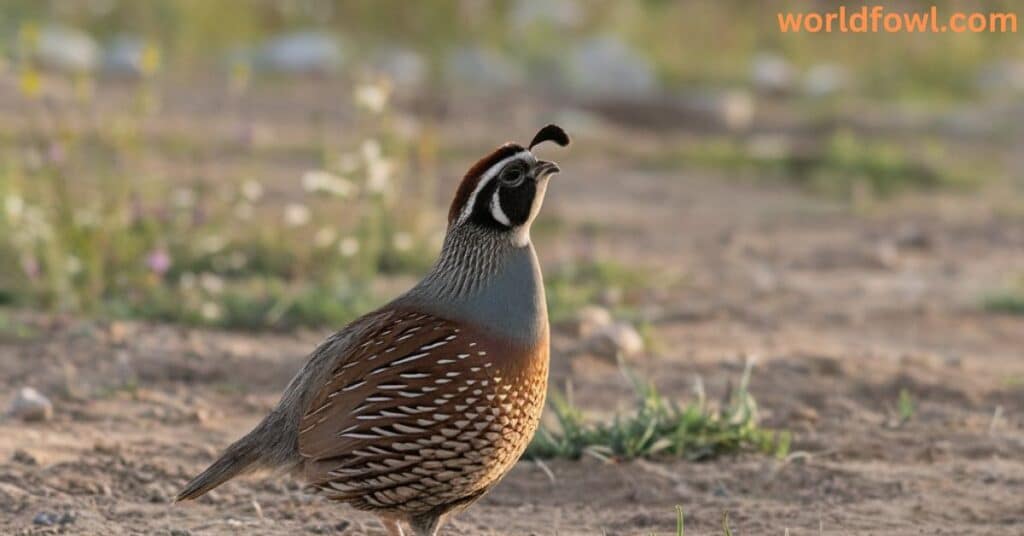
Quails are small, ground-dwelling birds from the Phasianidae family, which includes other well-known birds like pheasants and turkeys. Although they are often overshadowed by larger bird species, quails have some unique traits that make them stand out in the birdwatching community and wildlife circles.
Here’s the information about What Are Quails? presented in a table format:
| Characteristic | Details |
| Family | Phasianidae (the same family as pheasants, turkeys, and partridges) |
| Size | Small birds, typically weighing between 2 to 7 ounces |
| Habitat | Found in grasslands, forests, scrublands, and open areas |
| Physical Features | Short, stout bodies; rounded wings; small heads; brown and speckled feathers |
| Flight Ability | Capable of short, explosive flights, often used to evade predators |
| Behavior | Shy, flighty, and ground-dwelling, known for their flight response |
| Social Structure | Often found in small groups or coveys, especially during colder months |
| Diet | Omnivorous, feeding on seeds, grasses, insects, and small plants |
| Nesting | Nests are typically built on the ground, hidden in dense vegetation |
| Known Species | Northern Bobwhite, Japanese Quail, California Quail, among others |
| Conservation Status | Many species of quails are abundant, but some are threatened due to habitat loss |
This table summarizes the key features of quails, offering a concise and informative overview of these fascinating birds.
see also : Do Pandas Attack Humans? Cuddly Yet Deadly?
Do Quails Attack Humans?
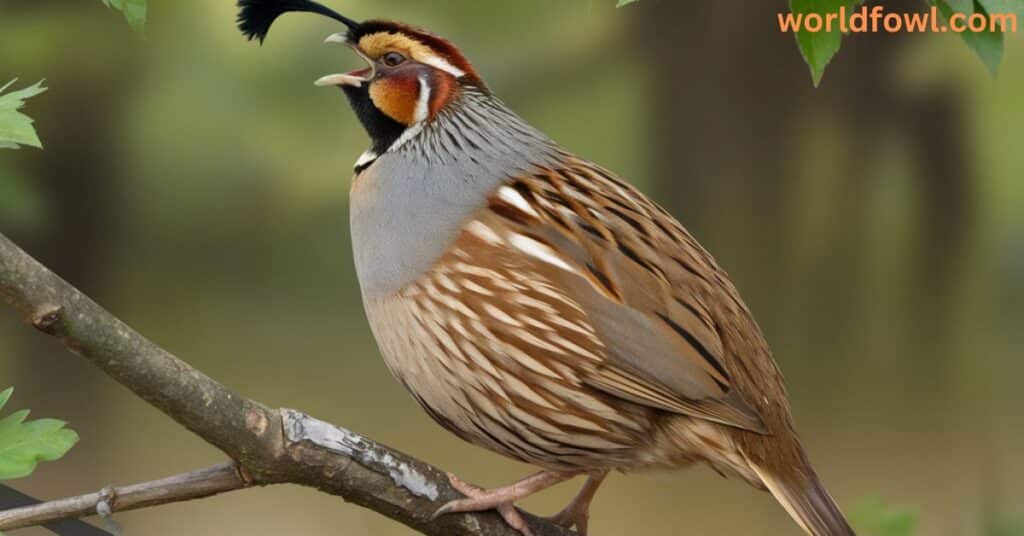
At first glance, quails seem harmless. They are small, timid birds that mostly try to avoid human interaction. But does that mean they can never attack? Let’s delve deeper into quail behavior to uncover whether quails could ever pose a danger to humans.
Quail Temperament and Aggression
Quails are generally known for their non-aggressive temperament. These birds do not seek out conflict and will typically try to hide from larger animals, including humans. In fact, quails are more likely to avoid humans than confront them, preferring to run or fly away rather than stand their ground.
Shy and Non-Aggressive
One of the defining characteristics of quails is their shy nature. These birds are flighty birds, and when confronted with a perceived threat, they typically prefer to escape rather than engage. Their natural instinct is to avoid conflict. Whether it’s a larger animal or a human, quails would rather use their flight response to put distance between themselves and the potential danger.
In many cases, when you spot a quail in the wild, it will flee from your presence if it feels threatened. This behavior is a defense mechanism, and it reflects the quail’s desire to avoid confrontation.
Rare Instances of Aggression
Although quails are generally peaceful, there are rare instances where they can display aggressive behavior. However, this aggression is not directed at humans but more at other animals or birds that they perceive as a threat to their nests or territory. For example, a female quail may become defensive if she feels that her eggs or chicks are in danger. In such cases, she may peck at intruders or make loud warning calls.
This aggression is more of a defensive response rather than an attempt to attack. The quail will use these tactics to warn off potential threats rather than engage in a prolonged confrontation.
Pecking as a Defensive Behavior
One of the few forms of aggression that quails might display is pecking. This behavior is often linked to territoriality or nest protection. During the nesting season, female quails, in particular, are very protective of their young and their nests. If they feel cornered or threatened, they may peck to defend themselves.
However, it’s important to note that pecking is not an attempt to harm humans. Quails do not have the physical capability or desire to engage in a full-on attack. In most cases, they are simply trying to create enough space between themselves and the perceived threat to flee to safety.
Do Quails Attack Humans?
Based on the behavior outlined above, it is clear that quails are non-aggressive and rarely attack humans. The chances of a quail attacking a human are extremely low, as their first instinct is to flee. They are not territorial towards humans and will generally try to escape if given the opportunity.
That said, quails can be defensive if they feel their nests are threatened or if they are caught off guard in a vulnerable situation. In these rare cases, the quail might peck or use loud vocalizations to deter the threat, but this is not the same as attacking.
you may like : Do Praying Mantis Attack Humans? Praying Mantis vs. Humans!
Why Quails Are Generally Harmless
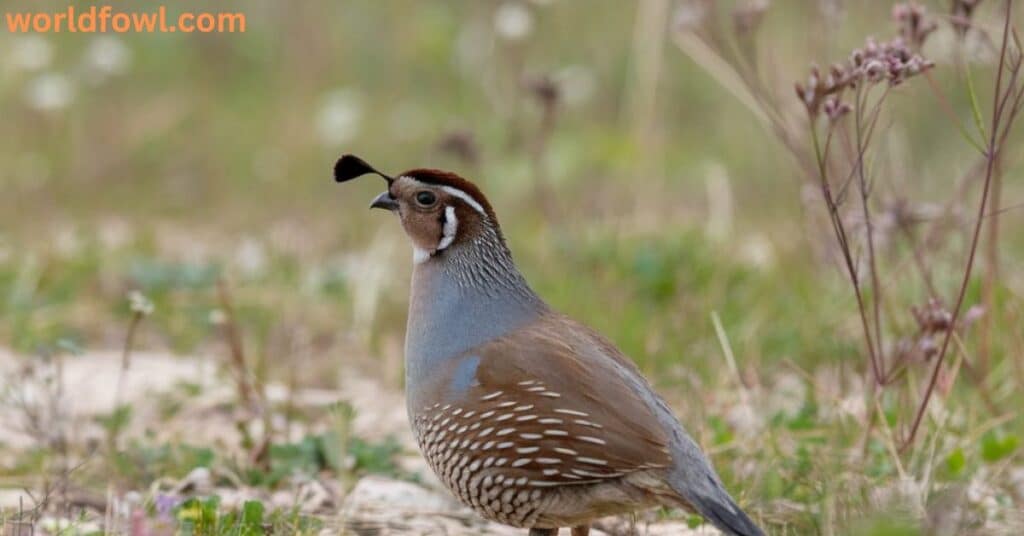
While quails can display certain defensive behaviors, they are, in most situations, harmless. Here are the key reasons why quails are considered non-threatening:
Small Size
Quails are tiny birds, with the largest species only weighing up to 7 ounces. Their small size limits their ability to cause harm, as they lack the physical strength to inflict injury. Unlike larger, more aggressive bird species like geese or turkeys, quails do not pose a significant threat to humans.
Avoidance and Flight Behavior
Quails are known for their avoidance behavior, preferring to flee rather than confront threats. Their strong flight abilities allow them to escape predators quickly and efficiently. Whether in the wild or captivity, quails will always try to flee rather than engage in a fight.
Instinctive Response to Danger
Quails rely on their natural instincts to survive. When threatened, their first line of defense is to take off quickly, using their flight response to escape. Their instinctive responses are designed to ensure their survival, and these responses typically involve fleeing from danger rather than attacking.
Territorial but Not Aggressive
While quails can be territorial, especially during the breeding season, they rarely engage in violent aggression. Instead, they display defensive behaviors such as vocalizations or pecking to protect their territory. These behaviors are usually meant to create distance between the quail and the perceived threat, not to engage in combat.
see also : Are Seagulls Protected? A Guide To Seagull Rights
Can Quails Be Dangerous in Any Way?
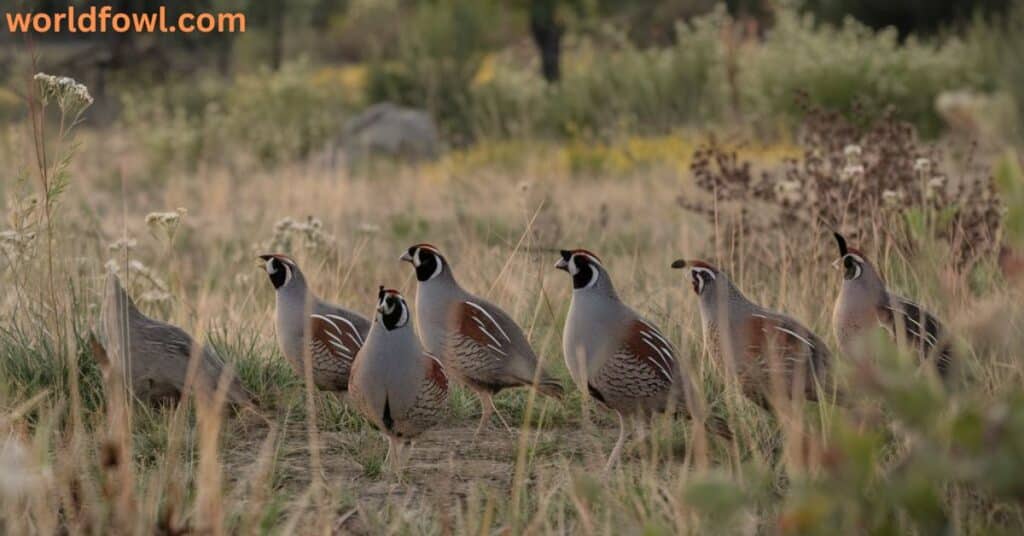
Although quails are generally harmless, there are a few risks to consider, particularly when it comes to handling quails or coming into close contact with them.
The Risk of Quail Disease
Like many wild birds, quails can carry diseases that may be harmful to humans. While the risk of contracting a disease from a quail is low, it’s still important to be cautious when handling them or coming into close contact with their droppings.
Salmonella
One of the most common diseases associated with quails is salmonella, which can be transmitted through contact with bird droppings or contaminated food or water. If you handle quail eggs, quail meat, or quail droppings, it’s essential to wash your hands thoroughly to avoid the risk of infection.
Avian Flu
Avian flu, or bird flu, is a viral disease that affects birds, including quails. While bird flu is rarely transmitted to humans, it can occur in certain circumstances. If you are handling wild quails or come across dead birds, avoid direct contact and take precautions such as wearing gloves to minimize the risk of infection.
you might like : Are Puffins Endangered – Revealing The Fate Of 3 Puffins
How to Safely Interact with Quails
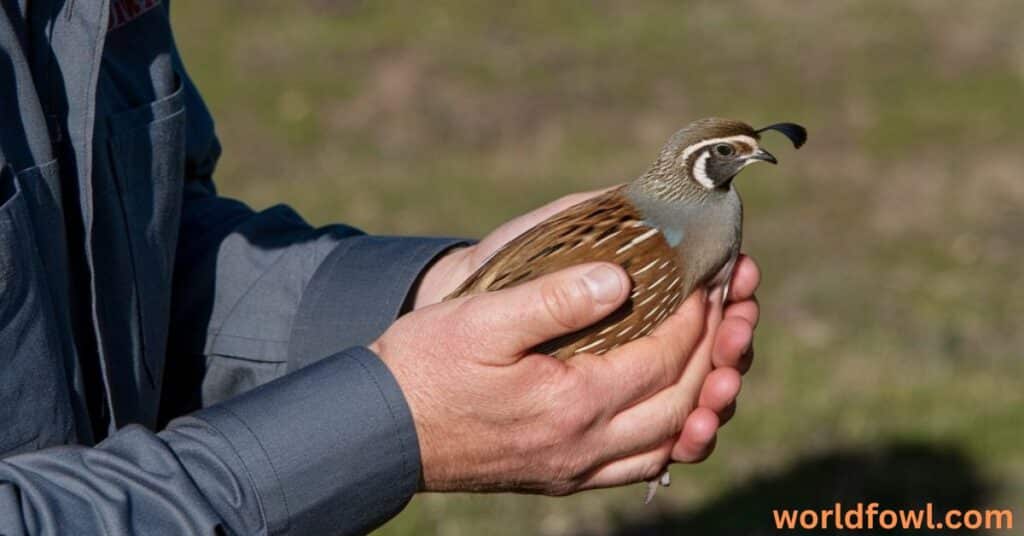
While quails are not likely to attack humans, it’s still important to respect their natural behaviors and observe them safely. Whether you’re encountering a quail in the wild or handling one in captivity, here are some guidelines to ensure a safe and positive interaction.
Observing Quails in the Wild
If you’re a bird watcher or a wildlife enthusiast, here are some tips for observing quails in their natural habitat:
- Approach Quietly: Quails are sensitive to loud noises and sudden movements. Approach them calmly and slowly to avoid startling them.
- Respect Their Space: Quails are shy creatures that value their personal space. If you spot one, make sure to give it enough room to escape if it feels threatened.
- Avoid Disturbing Nests: During breeding season, quails can become more defensive. If you come across a nest, avoid disturbing it, and give the mother bird plenty of space.
Handling Quails in Captivity
If you keep quails as pets or in captivity, it’s important to handle them with care. Here’s how to ensure safe and stress-free interactions with quails:
- Handle Gently: When handling quails, do so gently and avoid sudden movements. Their flighty nature makes them easily stressed, and rough handling can lead to injury or discomfort.
- Provide Adequate Space: Quails need room to roam and forage. Crowded cages or enclosures can increase stress and cause defensive behaviors.
- Create a Quiet Environment: Avoid loud noises or disturbances around quails, as these can trigger stress or defensive behaviors. A peaceful, quiet environment will keep your quails healthy and calm.
Final Verdict: Do Quails Attack Humans?
In conclusion, do quails attack humans? The answer is clear: no, quails are not aggressive birds and are unlikely to attack humans under normal circumstances. While they do possess certain defensive behaviors such as pecking or using their flight response, quails are generally peaceful and prefer to avoid confrontation rather than engage in aggressive behavior. Their primary instinct is to flee from threats, not to fight.
If you approach quails with respect for their space and natural instincts, you are unlikely to encounter any aggression. So, while it’s possible for a quail to exhibit defensive behavior in rare situations, attacks on humans are extremely rare, and most interactions with these shy birds are harmless.
By understanding their instinctive responses and natural behavior, you can enjoy observing quails in the wild or handling them in captivity without fear of aggression. Just remember: these are small birds with big instincts for survival, and their primary mode of defense is to avoid danger altogether.
FAQs
Can Quails Become Aggressive in Captivity?
While quails are generally non-aggressive, they can show signs of defensiveness if they feel cornered or threatened, particularly in captivity. During breeding season or when protecting their nests, female quails may exhibit more territorial behavior. However, they are still unlikely to attack humans. In captivity, it is essential to handle quails gently and provide them with enough space to reduce stress and avoid any defensive reactions.
Do Quails Carry Any Diseases Harmful to Humans?
Quails, like many wild birds, can carry certain diseases that may pose a risk to humans. Some of the most common illnesses include salmonella and, in rare cases, avian flu. To minimize the risk of transmission, always wash your hands thoroughly after handling quails or their eggs, and avoid direct contact with their droppings. While the risk of infection is low, practicing good hygiene is always a wise precaution.
Is It Safe to Keep Quails as Pets?
Yes, it is generally safe to keep quails as pets. They are relatively low-maintenance and easy to care for, as long as you provide them with the proper environment. Ensure that your quails have a spacious, secure enclosure with access to food, water, and plenty of natural behaviors like scratching and foraging. Quails are shy birds, so giving them time to adjust to their environment and avoiding excessive handling will help them stay calm and stress-free.
What Should I Do if I Encounter a Quail in the Wild?
If you come across a quail in the wild, it’s best to observe from a distance without disturbing the bird. Quails are shy and easily startled, so avoid making loud noises or sudden movements that could scare them away. If the quail seems to be nesting or with young chicks, give it plenty of space to ensure its safety and that of the offspring. Respect their natural behaviors and avoid any attempts to touch or capture the bird.
Do Quails Attack Other Animals?
Quails are generally non-aggressive towards other animals. Their primary defense mechanism is to flee from danger, not to engage in combat. However, during the breeding season or when protecting their young, female quails may show some territorial behavior, such as pecking at other animals that approach their nests. In general, quails do not pose a threat to other animals and prefer to avoid conflicts by hiding or escaping.
Conclusion: Do Quails Attack Humans?
Quails are fascinating creatures with a non-aggressive temperament that generally poses no threat to humans. Their natural instinct is to flee from danger rather than engage in combat. While there may be rare instances of defensive behavior, quail attacks on humans are extremely unlikely. Understanding their behaviors and respecting their need for space will ensure that you can enjoy observing these beautiful birds without fear of aggression.

Henry James is a seasoned blogger and a passionate storyteller on “World Fowl.” With years of experience crafting engaging content, he brings a unique blend of expertise and creativity to his writing. Henry specializes in exploring diverse topics with depth and clarity, captivating readers worldwide.

